
by Elizabeth Atalay | Nov 6, 2013 | 2013, Africa, Education, Social Good, World Moms Blog, World Voice, Younger Children
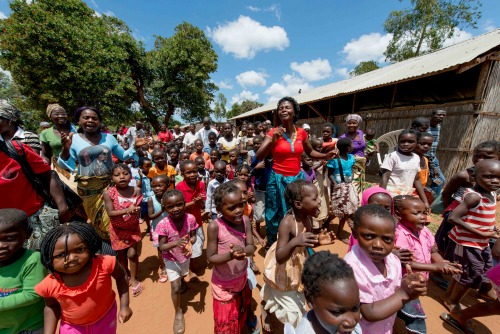
Singing and dancing is the order of the day as this procession of Save the Children preschool graduates, teachers and community members in Mozambique’s Gaza Province makes its way across the school ground to the nearby primary school, where the little graduates will be studying next year. Photo credit: Pei Ketron for Save the Children. October 2013.
In a newly published preschool programs are described as a promising policy option for improving the school readiness and later success of poor and disadvantaged children in rural Africa.
Tonight at 9pm EST World Moms Blog will join Save The Children and Multicultural Kid Blogs at #Moms4MDGs to discuss the importance of early education, and as a specific example, the success of the Save The Children preschool program in Mozambique. Ajla Grozdanic of Save The Children recently returned from a site visit to Mozambique and the early education programs there. She shared her insight in an interview with World Moms Blog as a lead up to tonights Twitter party:
World Moms Blog: In a Chicken & Egg sense, are early education programs only able to be initiated in areas where some basic infrastructure is already in place, i.e. access to clean water, healthcare & nutrition, or are they catalysts for communities to begin to pull out of extreme poverty?
AG: We are able to initiate education programs in communities at any level. In other words, having a basic infrastructure in place is not a pre-requisite for education programs, which can range from in-home daycare to in-school programs.
In fact, early childhood education can bring catalytic change for communities. Early childhood development centers and programs provide an opportunity to reach young children with basic services like healthcare and nutrition, which can be more difficult to deliver if we depended on parents to seek out these services on their own. Early childhood development centers also facilitate community mobilization, bringing parents and other community members together for projects, such as digging wells or cleaning stagnant water that hosts malaria.
Young children naturally learn from and imitate what’s in their environment–good or bad. For this reason, educating young children is key and it fosters the kinds of attitudes and behavior that can improve community well-being over the long term, such as developing good hygiene and healthy eating habits and sharing this knowledge with siblings and neighborhood children.
WMB: Could you explain a bit why Mozambique was a good fit for this program? What is the success rate for other similar early education programs Save the Children runs in other countries?
AG: Mozambique had very low coverage for preschool or early childhood development programs, so the need and demand was high. It’s also important to note that the local communities demonstrated an openness and eagerness to engage in these issues. Communities saw the potential and agreed to invest in their young children. Once they saw the results, which were very good, the word spread and the demand grew.
The World Bank Study, which is the first such evaluation of early childhood development programs in Africa, showed that children in rural Mozambique, who attended Save the Children’s preschool programs, were 24 percent more likely to enroll in primary school and were significantly better equipped to learn than children not covered by the program. While we haven’t had the funding to conduct similar studies in other countries where we offer such programs, our own results monitoring shows a similar success rate across the board.
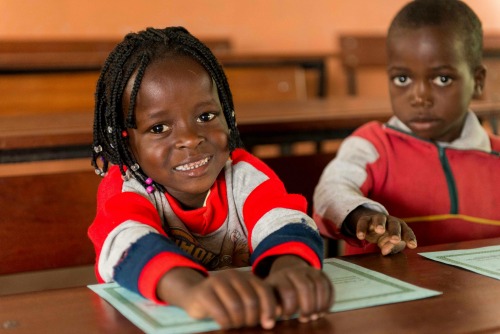
Save the Children preschool graduate, Vania, 5, from the Gaza Province in Mozambique, joined by a future classmate, gets a taste of what it will be like to sit at a real desk when she enters primary school next year. Preschoolers in her village are used to sitting on mats on the floor and were excited to sit in ‘big-kid’ chairs and desks at the nearby primary school. Photo credit: Pei Ketron for Save the Children. October 2013.
WMB: Do you see the benefits in terms of kids who have had these early intervention programs staying in school longer, and particularly for girls, marrying later or are these programs too new to tell yet?
AG: Children enrolled in preschool have a greater chance of going to school, going to school at the right age, and staying in school longer. They have higher graduation rates and are less likely to drop out of school or end up imprisoned. What’s more, staying in school is a mechanism to protect girls from early marriage. While it’s still too early to prove long-term benefits of preschool, such as that it results in girls marrying later in life, we hope to conduct such longitudinal studies in the future.
WMB: Are the children given meals through the program as an incentive for parents to send them or are the community members generally open and willing participants?
AG: It is usually not sustainable to provide meals to all children who are enrolled in preschool. Taking this into account, in most communities preschool lasts for half the school day so children can come home for meals. In some communities, parents might pool their resources in order to provide meals at preschools. In addition, preschools provide an opportunity to educate parents on how to improve nutrition for their child.
The willingness of parents to enroll their children in preschool varies from parent to parent and from community to community. Oftentimes, we’ll have a group of early adopters who are eager to enroll their children and whose success, in turn, inspires a wave of other parents–who prefer a stand-back, wait-and-see approach–to sign up their little ones.
WMB: Had you been to Mozambique before?
AG: No, this was my first time.
WMB: What is the best way people reading could support the Save the Children preschool programs in the developing world?
AG: Your readers could become a sponsor to support early childhood programs in developing countries. They could also advocate to the U.S. government to include preschool and early childhood development in its international aid programs. To learn more, visit www.savethechildren.org.
WMB: How have the mothers responded to these programs? (ie. gives them the opportunity to go to work or tend to smaller children)
AG: We encourage the participation of both mothers and fathers in their children’s education. Sending their children to preschool allows parents to tend to their daily chores, work in the field or otherwise provide for their family while knowing that their children are in good hands and are learning, to boot. In traditional societies, where childcare falls on women, preschools certainly offer an opportunity for women to engage in more productive labor and earn an additional income for their family. And we know from experience that when women earn more income for their families, they tend to invested in their children.
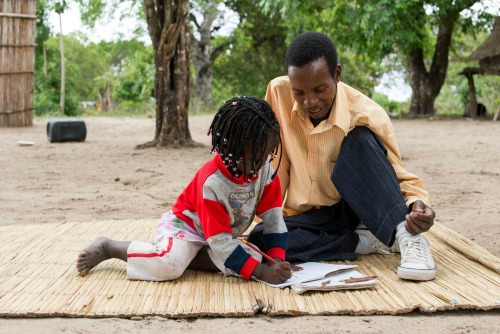
Vania, 5, practices the alphabet and counting every day with her father, Armando, who is a teacher at his daughter’s preschool, which is supported by Save the Children. Photo credit: Pei Ketron for Save the Children. October 2013.
This is an original interview and post for World Moms Blog.
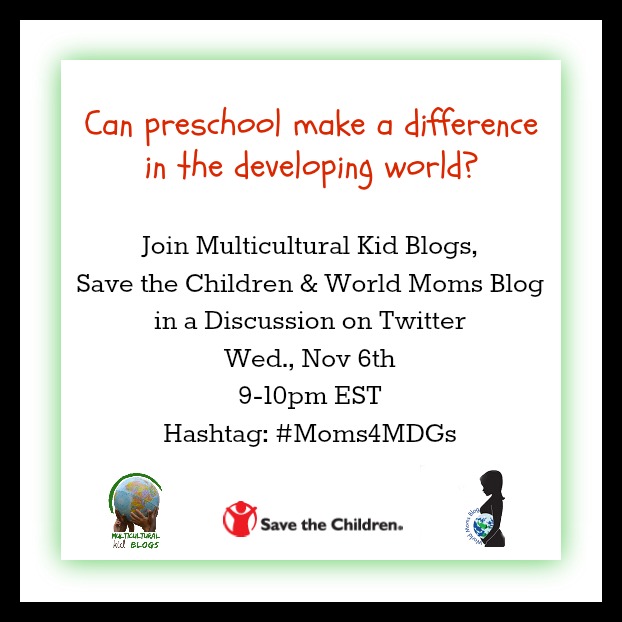

Elizabeth Atalay is a Digital Media Producer, Managing Editor at World Moms Network, and a Social Media Manager. She was a 2015 United Nations Foundation Social Good Fellow, and traveled to Ethiopia as an International Reporting Project New Media Fellow to report on newborn health in 2014. On her personal blog, Documama.org, she uses digital media as a new medium for her background as a documentarian. After having worked on Feature Films and Television series for FOX, NBC, MGM, Columbia Pictures, Warner Brothers, 20th Century Fox, and Castle Rock Pictures, she studied documentary filmmaking and anthropology earning a Masters degree in Media Studies from The New School in New York. Since becoming a Digital Media Producer she has worked on social media campaigns for non-profits such as Save The Children, WaterAid, ONE.org, UNICEF, United Nations Foundation, Edesia, World Pulse, American Heart Association, and The Gates Foundation. Her writing has also been featured on ONE.org, Johnson & Johnson’s BabyCenter.com, EnoughProject.org, GaviAlliance.org, and Worldmomsnetwork.com. Elizabeth has traveled to 70 countries around the world, most recently to Haiti with Artisan Business Network to visit artisans in partnership with Macy’s Heart of Haiti line, which provides sustainable income to Haitian artisans. Elizabeth lives in New England with her husband and four children.
More Posts
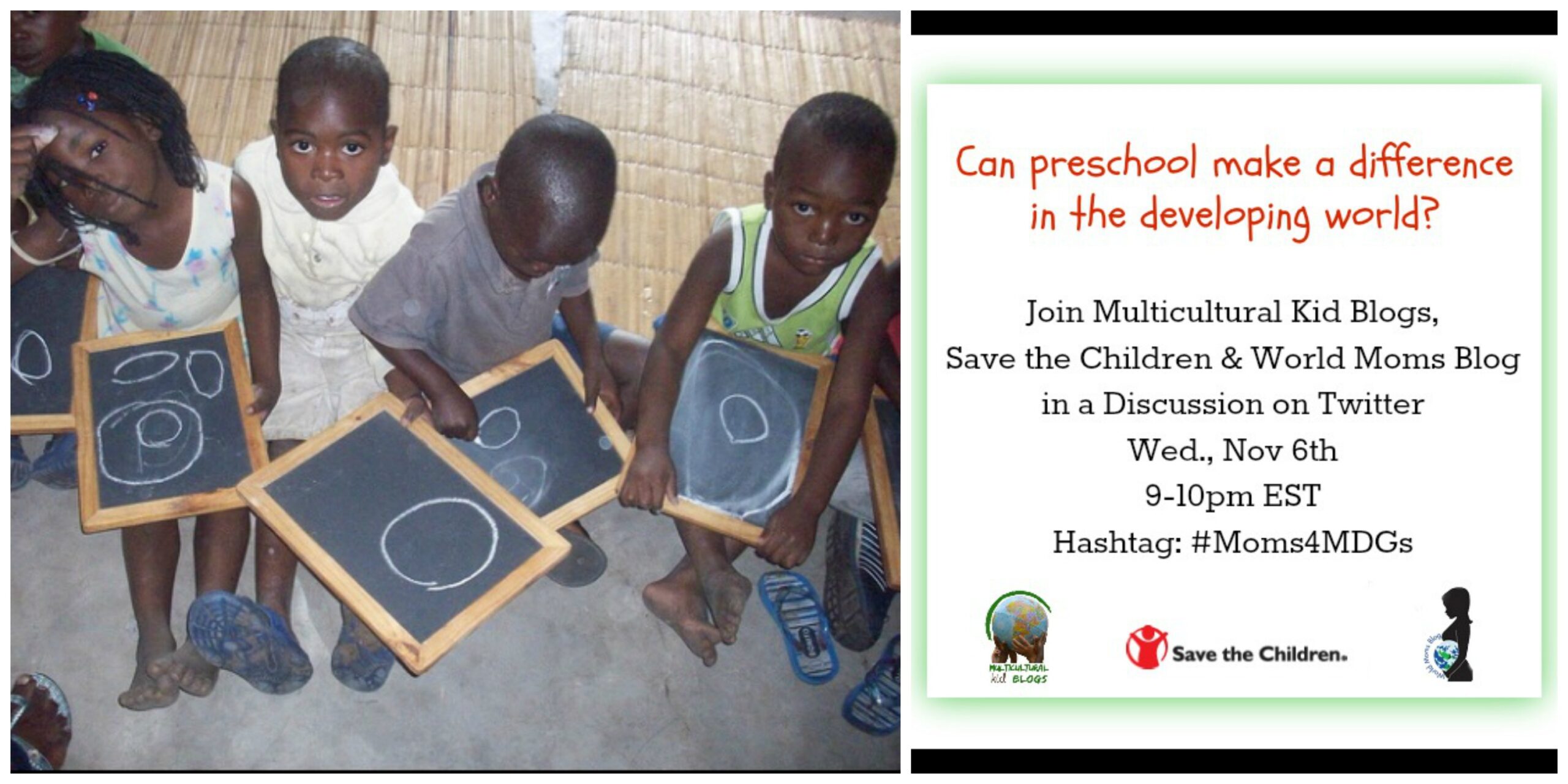
by Elizabeth Atalay | Nov 5, 2013 | 2013, Childhood, Education, Social Good, World Voice, Younger Children
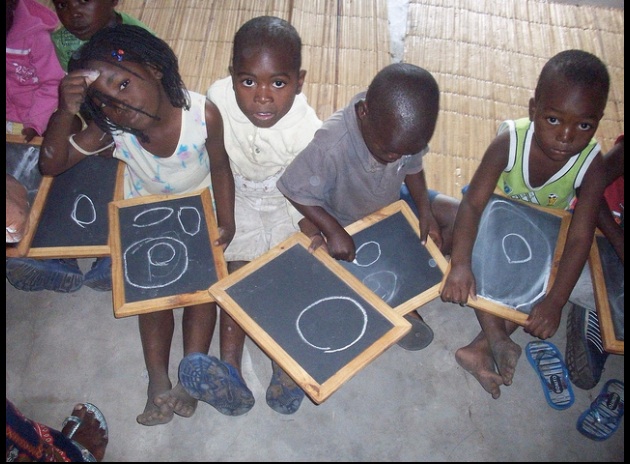
Photo Credit Save The Children
Where I live it is a given that most parents will send their kids to pre-school, some as young as two years old. It is common belief that early education builds a strong foundation for future learning, and we take for granted that our kids will go on to higher education. In other areas of the world where food security, clean water, sanitation and extreme poverty are primary concerns, education can be a luxury. In some cases in these areas it is not uncommon for an older child to begin formal primary education for the first time creating classrooms of mixed ages.
Back in 2008, a $1 million donation from the 2007 Idol Gives Back television special, helped to build escolinhas or preschool centers targeting orphans and vulnerable children for Save the Children‘s program in Mozambique. Since then the program has reached about 5,000 three to six year olds and their families, and it continues to run with the help of trained volunteers from rural communities.
Children in developing countries, like Mozambique, who attend early childhood development programs are more likely to enroll in school and enter school at the right age. This is important because children who are over-age for their grade level are more likely to drop out, so early childhood development programs actually increase the chances that children will stay in school longer.
Due to the success of the preschool centers Save The Children was able to continue to find funding, and recently the progress seen in the area caught the eye of the Government of Mozambique, resulting in the implementation of similar early childhood education programs throughout the country.
A new World Bank evaluation shows early childhood programs help children thrive and learn more in rural Africa. The recently released , is good news for children and families in Africa.-Save The Children
In a country where most inhabitants live in rural interior areas that are prone to “hungry seasons” of flooding or drought, kids enrolled in early childhood development centers benefit from access to health care and interventional care such as deworming, malaria prevention, nutritional support or social welfare.
Investment in early childhood development can provide the greatest return, and the results from these Early Learning Centers are proof. It is important to reach kids before it is too late, before they have dropped out of school, or grown up without reaching their full potential. Development aid and countries have the opportunity to make a lasting difference in health outcomes, economic productivity, and educational opportunities by investing more human and financial resources into early childhood development programs.
To find out more about early education and Save The Children’s program in Mozambique join us tomorrow night, Wednesday November 6th from 9-10pm EST for a #Moms4MDGs twitter party with Save the Children, Multicultural Kids Blogs and World Moms Blog! Hope you can make it!

This is an original post written by Elizabeth Atalay of Documama for World Moms Blog.

Elizabeth Atalay is a Digital Media Producer, Managing Editor at World Moms Network, and a Social Media Manager. She was a 2015 United Nations Foundation Social Good Fellow, and traveled to Ethiopia as an International Reporting Project New Media Fellow to report on newborn health in 2014. On her personal blog, Documama.org, she uses digital media as a new medium for her background as a documentarian. After having worked on Feature Films and Television series for FOX, NBC, MGM, Columbia Pictures, Warner Brothers, 20th Century Fox, and Castle Rock Pictures, she studied documentary filmmaking and anthropology earning a Masters degree in Media Studies from The New School in New York. Since becoming a Digital Media Producer she has worked on social media campaigns for non-profits such as Save The Children, WaterAid, ONE.org, UNICEF, United Nations Foundation, Edesia, World Pulse, American Heart Association, and The Gates Foundation. Her writing has also been featured on ONE.org, Johnson & Johnson’s BabyCenter.com, EnoughProject.org, GaviAlliance.org, and Worldmomsnetwork.com. Elizabeth has traveled to 70 countries around the world, most recently to Haiti with Artisan Business Network to visit artisans in partnership with Macy’s Heart of Haiti line, which provides sustainable income to Haitian artisans. Elizabeth lives in New England with her husband and four children.
More Posts

by Nihad | Oct 30, 2013 | 2013, Egypt, Family, Health, Holiday, Humanity, International, Life Balance, Life Lesson, Parenting, Uncategorized, World Motherhood
 Writing this post was the most challenging of all the posts I’ve ever written. You may not find it that valuable, but I will still go with writing and publishing it. Actually I wanted and needed to write, but I didn’t know what exactly I wanted to share it. My thoughts and my mind are a real mess.
Writing this post was the most challenging of all the posts I’ve ever written. You may not find it that valuable, but I will still go with writing and publishing it. Actually I wanted and needed to write, but I didn’t know what exactly I wanted to share it. My thoughts and my mind are a real mess.
Since the beginning of the 2013, life was really hard for me. First, I lost my father, and although I was accepting this fact and apparently I was calm, I was unaware that I was plunging into depression. It took me five months to realize it and accept the idea that I needed therapy. When I started to feel better, the situation in Egypt deteriorated, and we were under curfew for months. I was imprisoned at home and rarely went out. I lost interest in everything except the political talk shows, but later on I realized that was the main cause of my feeling down and fearful most of the time. I totally lost motivation to do anything and lost interest in anything. All I wanted was to stay still and silent for hours. (more…)

Nihad is an Egyptian woman, who was born and has lived her whole life in Alexandria, Egypt. She says, “People who visited this city know how charming and beautiful this city is. Although I love every city in Egypt, Alexandria is the one I love the most.”
She is a software engineer and has worked in the field for more than twenty years. But recently she quit her job, got a coaching certificate and she is now a self employed life and career coach. She says, “I believe that women in this era face big challenges and they are taking huge responsibilities. That's why I have chosen my niche -- women looking for happiness and satisfaction. I help and support them in making whatever change (career change, life change, behavior change, belief change…) they want to bring more satisfaction and happiness in their lives.”
Nihad is a mother of two lovely boys, 15 and 9 years old. She states, “They are the most precious gifts I have ever had. I madly love them, and I consider them the main source of happiness in my life.”
Our inspiring mother in Egypt can also be found at Aurora Beams Life Coaching.
More Posts

by Jennifer Burden | Oct 29, 2013 | 2013, Family, World Voice
Just a few months ago, I had the opportunity to tour a New Jersey, USA preschool, whose playground had been covered in sludge from Super Storm Sandy. That was the day Save the Children announced their Get Ready, Get Safe program, which advocates for emergency disaster planning for schools, preschools and day cares in the United States.
(But what about where you live? Read on for some helpful tips that can be applied anywhere on the globe…)
Today marks one year since Super Storm Sandy hit the U.S., and within the past year, our planet has experienced other natural disasters that have made their devastating impact, too, including the floods in the Philippines.
“Sandy has been toughest on children: VIDEO: Save the Children: Hurricane Sandy 1 Year Later.”
What can you do to prepare your community?
Ask your children’s school or day care center if they have an emergency preparedness plan. If not, suggest one!
What can you do to prepare your family?
Check out this graphic from Save the Children below to assist you in your family safety plan:
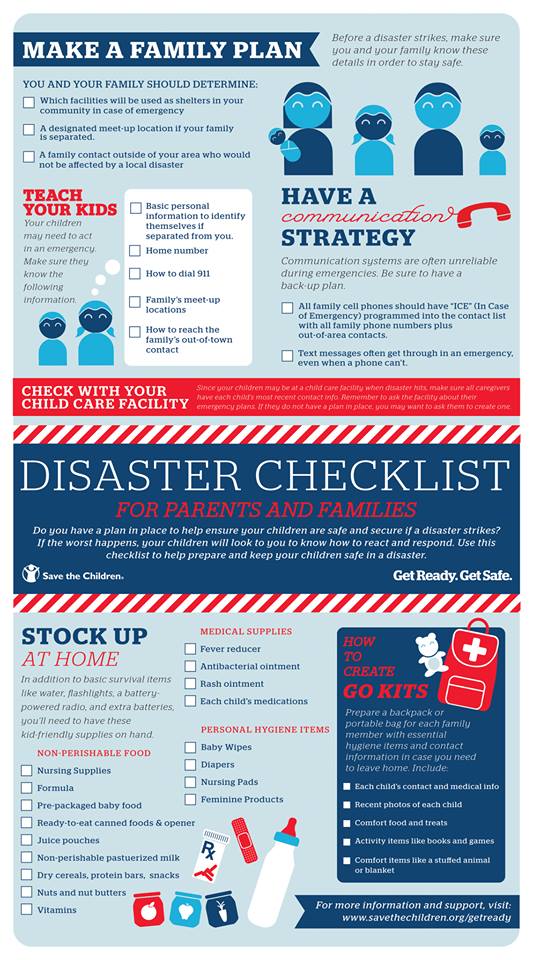
I’ve got to go now to make my “go kit.” I hope you will, too.
This is an original post to World Moms Blog by World Mom, Jennifer Burden of New Jersey, USA.
Photo credit to Save the Children.
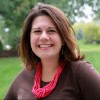
Jennifer Burden is the Founder and CEO of World Moms Network, an award winning website on global motherhood, culture, human rights and social good. World Moms Network writes from over 30 countries, has over 70 contributors and was listed by Forbes as one of the “Best 100 Websites for Women”, named a “must read” by The New York Times, and was recommended by The Times of India.
She was also invited to Uganda to view UNICEF’s family health programs with Shot@Life and was previously named a “Global Influencer Fellow” and “Social Media Fellow” by the UN Foundation. Jennifer was invited to the White House twice, including as a nominated "Changemaker" for the State of the World Women Summit. She also participated in the One Campaign’s first AYA Summit on the topic of women and girl empowerment and organized and spoke on an international panel at the World Bank in Washington, DC on the importance of a universal education for all girls. Her writing has been featured by Baby Center, Huffington Post, ONE.org, the UN Foundation’s Shot@Life, and The Gates Foundation’s “Impatient Optimists.” She is currently a candidate in Columbia University's School of International and Public Affairs in the Executive Masters of Public Affairs program, where she hopes to further her study of global policies affecting women and girls.
Jennifer can be found on Twitter @JenniferBurden.
More Posts - Website
Follow Me:


by Olga Mecking | Oct 28, 2013 | 2013, Motherhood, World Motherhood
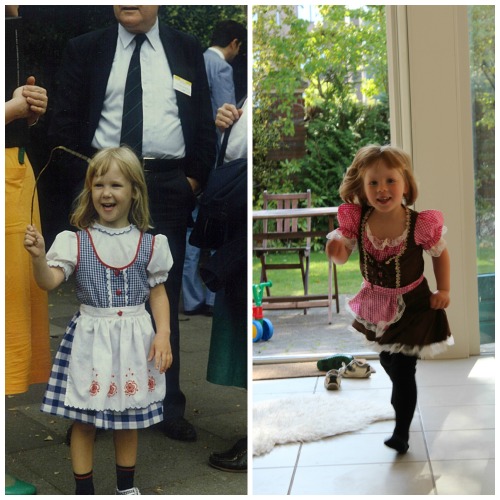
Left: The author, Olga Mecking, when she was growing up in Germany. Right: Olga’s daughter today in the Netherlands.
Sometimes, I find myself rediscovering simple truths about life in general and parenting in particular. My latest epiphany is this: “My child is not me.”
On the contrary to all the books and articles out there that tell us that we will grow into our parents, I don’t think this is the case. I think that while our parents influence our lives, we’re still separate individuals with our own thoughts, ideas and opinions.
And never has this simple truth rung more true to me than it has when my eldest daughter started school. I’ve been very worried about sending her to school at the tender age of four. I thought back to my old school days and worried and worried. And worried some more because my experiences weren’t all that great.
But this is when I realized: my child is not me! Pretty much everything about her will be different.
I was born and raised in communist Poland and went to school shortly before Communism fell. As much as I love my country, going to school in these times wasn’t so great.
We had to learn everything by heart. Language teachers weren’t too good. Classes were huge and the teachers were strict, even to the point of giving bad grades for pretty much anything. Nobody knew anything about bilingualism, and I was even lucky to have German classes offered at my school, as bad as they were.
But my child is not me.
She goes to school in a modern, Western country and has been speaking 3 languages from birth. Her teacher is amazing and lets the children play a lot. They go outside for recess and learn letters and numbers, and they even went on a school trip. In my daughter’s school, it is normal to speak two or more languages.
As a child, I was shy and timid. My idea of a good day was, and still is, to stay at home and read a book. School proved to be too much for me at times: too loud, too big. On the other hand, I was often told to sit still, be organized, and listen when all I really wanted to do was run around.
But my child is not me.
She seems to be more of an extrovert than I ever was. She could be outside all the time, playing, jumping, swinging, playing with other children; and, she seems to enjoy school.
I even often receive photos from her teachers. Guess who of all the children in the pictures has the biggest smile? My blond beautiful daughter.
When I went to school, we were taught about computers, but seldom used them for school. We were told that learning is hard work and were given grades for our work, even for our paintings. After school, I totally stopped painting.
But my child is not me.
She thinks learning is fun and can use all the great apps for learning, and she has a great selection of books in all the languages that she’s learning. She loves getting her hands dirty with paint and uses them to paint on a large piece of paper. She paints the funniest creatures and people, and she gives them funny names.
My daughter and I both have straight blond hair. Many people tell me she looks like me. I think I have an idea who she got her willpower and stubbornness from, but my child, she’s not completely me.
This is an original post to World Moms Blog by Olga Mecking in the Netherlands.
Photo credit to the author.
Olga is a Polish woman living in the Netherlands with her German husband. She is a multilingual expat mom to three trilingual children (even though, theoretically, only one is trilingual since she's old enough to speak). She loves being an expat, exploring new cultures, learning languages, cooking and raising her children. Occasionally, Olga gives trainings in intercultural communication and works as a translator. Otherwise, you can find her sharing her experiences on her blog, The European Mama. Also take a while to visit her Facebook page .
More Posts - Website
Follow Me:




by Kyla P'an (Portugal) | Oct 25, 2013 | 2013, Being Thankful, Childhood, Communication, Domesticity, Education, Entertainment, Home, Humor, Kids, Life Lesson, Me-Time, Motherhood, Parenting, Relationships, School, Stress, Traditions, USA, World Motherhood, Younger Children
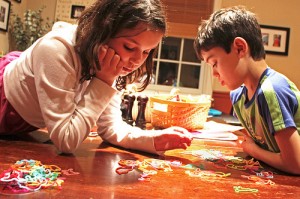 Last week my 7-year-old daughter invited a friend over for a playdate after school. My daughter and this child aren’t close friends, in fact, they aren’t even in the same class at school but they did play on the same town soccer team last year and the child has invited my daughter over a few times—including to her 7th birthday party—so we were due to reciprocate.
Last week my 7-year-old daughter invited a friend over for a playdate after school. My daughter and this child aren’t close friends, in fact, they aren’t even in the same class at school but they did play on the same town soccer team last year and the child has invited my daughter over a few times—including to her 7th birthday party—so we were due to reciprocate.
This particular little girl comes from a family of four children. She lives nearby in a large house in a posh sub-division and with four kids in her home, they have a lot of toys and things to play with.
Furthermore, her mom is one of those Alpha moms, who runs various nominated volunteer positions at school and who always seems to have her stuff together: pressed and polished at morning drop-off and calm and controlled when you see her in the pick-up line at the end of the day. You know the sort. (more…)
Kyla was born in suburban Philadelphia but spent most of her time growing up in New England. She took her first big, solo-trip at age 14, when she traveled to visit a friend on a small Greek island. Since then, travels have included: three months on the European rails, three years studying and working in Japan, and nine months taking the slow route back from Japan to the US when she was done. In addition to her work as Managing Editor of World Moms Network, Kyla is a freelance writer, copy editor, recovering triathlete and occasional blogger. Until recently, she and her husband resided outside of Boston, Massachusetts, where they were raising two spunky kids, two frisky cats, a snail, a fish and a snake. They now live outside of Lisbon, Portugal with two spunky teens and three frisky cats. You can read more about Kyla’s outlook on the world and parenting on her personal blogs, Growing Muses And Muses Where We Go
More Posts - Website
Follow Me:























